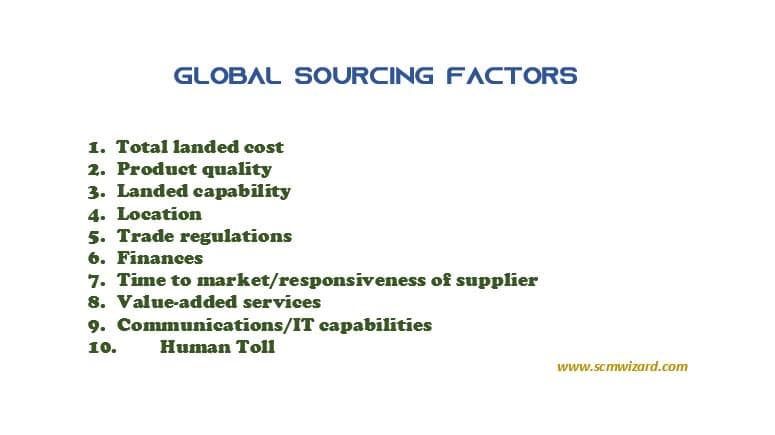A number of people even today think that global procurement and international procurement are often the same, but they are stark different from one another.
Before entering into the realm of sourcing services; you need to understand the difference between global and international in general order.
To explain it correctly, the term ‘Global‘ refers to the entire world, whereas, the term, ‘International‘ indicates to two or more nations.
As international demand grows for more and better products and services, competitiveness becomes more intense. Organizations must keep up with quickly changing technology while also diminishing their costs, increasing quality, and enhance customer service at all stages of the value chain.
This is the reality of international trade.
What is Global Sourcing?
Global Sourcing is the procedure of sourcing goods and services from the international market throughout geopolitical boundaries. It is essential because firms sourcing from both inside and outside their country borders are better able to compete.
It mainly aims to utilize worldwide efficiencies like lower cost skilled labor, cheaper raw materials, and other economic factors- tax breaks and low trade tariffs. For instance, clothing and shoes manufactured in China and Thailand; the call centers in the Philippines.
The main reasons for doing global sourcing for international business are as follows:
- Accessibility of raw materials
- Availability of cheap wages
- Reciprocation of services
Organizations nowadays think about the best way to respond to the advancement of global strategies and approaches, competitive demands, such as global sourcing strategies, which will become an increasingly attractive option.
A majority of the organizations do not have in place well-developed global sourcing strategies. Advancement in opportunities is indeed attractive and mostly unrealized. Perceiving these opportunities needs a complete understanding of global sourcing.
The observation will help supply managers better understand what it takes to shift from basic international purchasing to integrated global sourcing strategies and approaches.
What is International Purchasing?
Purchasing is basically, the activities related to the acquisition of raw materials, goods or services required for firms to accomplish their business goals. When those purchasing activities are performed in international markets to support the firm’s operations and make sure a reliable source of supply, then the process is referred to as ‘International Purchasing.’
With the economic globalization procedure, one can experience that domestic and international buying activities are becoming unclear and are converging in a single function within companies.
The chief reasons for organizations to purchase internationally are as following:
- Changes in the business environment
- Insufficient domestic capacity
- Excellent quality
- Lower prices
- Better delivery
- Access better technology

Factors to consider when sourcing globally:
At present, leading-edge organizations have shifted the focus of their international sourcing efforts to that of a proactive strategy, which pursues a sustainable competitive benefit.
This blog includes the challenges, requirements, and benefits of international sourcing through a brief literature review. The various researches on its focus on the several aspects of global sourcing that affect its ability to impact a firm’s competition.
So your business is experiencing better-than-expected growth, and you’re ready to take the next step and expand globally?
A handful of critical factors to consider when making global sourcing decisions. Either you are new to importing, or just considering sourcing from new origin region, keep in mind there many resources available to help make a well-thought-out choice.
Once you make an informed decision, there is a huge opportunity to enjoy conducting a profitable business in the global market. Below are ten primary points companies must remember when looking to source from across the globe.
- Total landed cost
- Product quality
- Landed capability
- Location
- Trade regulations
- Finances
- Time to market/responsiveness of supplier
- Value-added services
- Communications/IT capabilities
- Human Toll
Some companies that start in a small-scale slowly becomes international, meaning it spreads its operations in more than one country.
However, it requires to expand, if it encounters a saturated market in the real states. In certain situations, it begins handling a wide variety of projects, which is called as global existence.
The significant differences between International Purchasing and Global Sourcing are as follows:
Procurement deals with the sourcing activities, negotiation and strategic selection of goods and services, which are usually crucial to a company. Whereas, purchasing is the process of how products and services are ordered.
Organizations that procure a wide range of goods and services from any nation in the world are referred to as a worldwide company.
However, few companies procure from one or two countries and distribute among those specific countries, which is known as an international company.
A whole world participates in the domain of global sourcing service. There is a broader scope of businesses in the case of comprehensive procurement services than international procurement services. However, international sourcing is a business done between two or more specific nations.
Worldwide procurement companies invest in other nations. They maintain branches in many countries around the world. However, international sourcing companies conduct business with particular countries and have offices in only those nations.
A global sourcing agency distributes its resources among its branches throughout the world, whereas, a global purchasing company globally handles projects. A global sourcing agency has independent offices in other countries. In global purchasing, there is no hard and fast rule that a specific nation has to handle a particular project with another particular country.
However, an international procurement agency does not operate that way.
When experts say that the procurement agency is worldwide affected, it reflects global damage to the company’s procurement procedure.
Otherwise, when they say that international procurement is concerned, it indicates that the procurement procedure for a particular agency in specific countries could be affected.
Consequently, it can be concluded that the terms, ‘global‘ and ‘international‘ have entirely differing meanings.
Having a better understanding of the difference between global sourcing service and international sourcing service, you can make yourself heard at the international trade seminar.







this a very nice I have learnt a lot thanks
Hello, thank you for the insightful document. I have a question, the company I current work have changed my title role from Global Sourcing Manager to Sourcing Manager with the reason that they are the same positions and I will continue doing my job as a Global Sourcing specialist. I am looking for data how to challenge this decision, would you be able to provide me your feedback? Thank you very much in advance. Liz
Thank you so much for sharing the information. It’s so greatful